of the development of the accounting
system, in our opinion, is a source of formation of its new concepts,
principles, functions, methods and techniques. In addition, the most important
result of such research may be the formation of a new theoretical paradigm and
the development of innovative methodology based on the use of trends not only
in accounting but also a set of basic sciences, including modern information
systems, modeling theory, mathematical statistics and others.
The
relevance of such a study is enhanced by decentralization processes and its
results in Ukraine. The relevance of such a study is enhanced by
decentralization processes and its results in Ukraine. To confirm, we present
the results of polls conducted by the Ilko Kucheriv Democratic Initiatives
Foundation together with the Razumkov Center's sociological service. The survey
was conducted from 14 to 19 August 2020 in all regions of Ukraine except the
Crimea and the occupied territories of Donetsk and Luhansk regions. 2,022
respondents over the age of 18 were interviewed by face-to-face interviews at the
place of residence of respondents in a sample representing the adult
population. The theoretical sampling error does not exceed 2.3%.
Survey
results:
Since the beginning of the
decentralization reform in 2015, local budget revenues have increased significantly.
Have you felt any results of using these funds (improving the quality of
services, landscaping, social assistance) during this time?
Table 1: Have you felt any results
of using these funds during this time?
|
|
August 2016
|
June 2017
|
August 2018
|
August 2020
|
|
Yes,
I felt some changes for the better
|
16,2
|
16,5
|
18,2
|
26,8
|
|
No,
I did not feel any changes
|
67,2
|
55,4
|
60,8
|
46,7
|
|
I
only felt the change for the worse
|
8,4
|
16,4
|
13,9
|
12,1
|
|
Hard to tell
|
8,2
|
11,7
|
7,2
|
14,3
|
Source:
Razumkov Center's (2020)
We believe that such not very optimistic results of
decentralization in Ukraine are due to the shortcomings of the accounting
system in the public sector. Despite its reform, carried out in accordance with
the approved Accounting Modernization Strategy, it is not a sufficiently
effective source of information for management and control. Which negatively
affects the results of decentralization.
The
history of accounting, which is studied by many Ukrainian and foreign scholars,
in this context is an important tool to improve the quality of this system and
strengthen its control function. The value of scientific understanding of the
historical development of the principles of accounting is explained by the
important role of history in determining the possibilities for further
improvement of accounting.
1.
LITERATURE REVIEW
Studies of specialized literature
sources that cover the issues of public property accounting (starting with
community property), and which in one way or another in connection with the
systemic transformation of management and development of state institutions
relate to accounting in budgetary institutions indicate that the discussion of
the role of management in the formation of the accounting system is not
completed. The issue of the date of occurrence
of accounting in the public sector has also not been resolved.
In
particular, Svirko (2006) notes that an important point should be the starting point of the
formation of the Ukrainian state and argues for his position. Thus the
scientist gives the detailed list of information sources and the characteristic
of features of development of the account, since VI century. to this day.
The
opinion that the accounting of public property originated in the primitive
communal system is also entitled to exist. Thus, Marx (1885) noted that already in the oldest communities there is an accountant and
accounting is a function of the official of the community. That is, the need
for accounting is related to the need to register the economic facts that were
carried out within the social structural unit, and therefore it is more
appropriate to consider it as a practical activity. Nevertheless, this period
should be positioned as a stage in the emergence of community accounting.
However,
we believe that it is more important not to establish the date of birth of
accounting, but to investigate how its content and organization depended on the
managerial revolutions. This
position is not new, because many scientists emphasize that it is the
management system that determines what should be the accounting and what
accounting data are needed to make management decisions.
In
particular, recent research on this issue has been conducted by Rasid, Saruchi
and Tamin (2019). In it, the authors argue that the awakening of modern
technology in the era of this 4th Industrial Revolution (4IR) has had a
tremendous impact on the entire landscape around the world, including the
business sector. To be aligned with the technological advancements, management
accountants have to keep proactive and prepare for any unexpected changes to
ensure that their business remains lucrative and stays relevant in the
industry.
Nonetheless,
the changing role of the management accountant due to the presence of 4IR is
imminent. As a result, this paper deliberates on how the 4IR changes the role
of management accountants, including what knowledge and skills are crucial for
them to grasp in order to adapt adequately in this 4IR era. In addition, this
paper also reviews the challenges that they have to face. The study can be of
prime importance to business firms in identifying the role of the management
accountant in this 4IR era and to prepare for the ubiquitous challenges that
may perturb their efficacies. Agreeing with this
position, it should be noted that we believe that every management revolution
has had its impact on accounting. Proof of this is the development of
management accounting. The principled position on the purpose of such accounting is laid down
even in its name.
Without going into a detailed review
of the stages of development of management accounting and its basic concepts,
which are described in detail by many other scholars and practitioners, such as
Kaplan (1984) and others, we note that management accounting in the public
sector is insufficiently studied.
Instead, the history of accounting
shows that each new stage is appropriately linked to the transformational
changes that take place in the management system and that affect the purpose,
objectives, principles and functions of accounting.
2.
METHODOLOGY
The methodological basis of the
study is the dialectical method of cognition. The use of the historical method
allowed to establish the logical dependence of the evolution of accounting on
the requirements of the management system. Analytical and systematic methods
were used to identify and form descriptions of the relationship of the
accounting system in budgetary institutions with the processes of management
system transformation and management revolutions.
3.
RESULTS
3.1.
Systemic transformation of
management (managerial revolutions) and its impact on accounting in the budget
sphere
The
process of targeted and structural change of management approaches can be
positioned as a systemic transformation of management, which is a factor that
has a direct impact on the development of accounting methodology. Therefore, it
is advisable to distinguish the stages of its development in accordance with
the sequence of changes in management requests (depending on the change of
management requests and purpose) and the corresponding formation of new
accounting characteristics.
Agreeing
with the predicted debatability of the author's position, it should be
emphasized that it is important in terms of historical background and role in
the process of understanding the development of accounting as a professional
activity and science. In this regard, the existence of the concept in question
has its meaning, and therefore it should be specified by providing appropriate
characteristics.
In
the modern scientific literature, considerable attention is paid to ensuring
the appropriate adequacy of information produced by accounting, and the
problems of its compliance with the requirements of the management system. It
is fair to recognize the impact of the latter on the system characteristics, as
well as the tasks, methodology and organization of accounting.
This
is confirmed by the historical development of not only the theory but also the
practice of its conduct, comparing the characteristics of accounting in
different historical periods, in particular after the administrative
revolutions. It is fair to say that in various scientific sources there is no
consensus on the number and types of such revolutions.
The basis of our study is the
position of Novychkov (2007), who scientifically
substantiated the existence of ten administrative revolutions. Thus, the emergence of accounting from a theoretical
point of view is considered the first stage of its development. Its
characteristic features are: the need for knowledge about the volume of objects
of accounting; possibility to save information; motivation to control values
(a certain stock of products is required for survival).
The
given characteristics are quite logical to carry to the plane of performance
taking into account the information function (3rd century
BC). This stage is characterized by the fact that it belongs to the period of
the first administrative revolution, which was called organizational and state.
It is she, in our opinion, became the basis for the emergence of accounting for
community property.
The
transformation of management structures, in particular the transition from individual
to public management required new approaches to the formation of information.
The mere availability of data on the amount of resources no longer met the
needs of management. There was a need to manage the use of resources, which
involved the formation of data on the directions of their consumption.
Evidence
of the actualization of this problem was the beginning of the activities of
managers-functionaries. Accounting began to play the role of an information
source of community property management. Accordingly, a certain accounting
structure began to form, which, in addition to information on income and
expenditure for control purposes, began to serve as a basis for planning and
forecasting. The management vertical of the accounting information movement
appeared and the consolidated information began to be formed.
The
second administrative revolution (religious-commercial) is associated with the
transition to a centralized management structure and the participation of
government agencies in commercial operations. This required the formation of
information to which external interested users would have access. However,
because the storage media was not compact, access to such information was
limited.
A
peculiar way out of the situation was the emergence of the first written
accounting records on papyrus, which provided for the grouping of objects of
accounting. The complication of the
management structure of the community hierarchy from the grassroots management
functions has led to improved accounting, the emergence of systematic records
and compilation of data. This allowed you to control the status and volume of
objects and their groups, as well as generate generalized data. A
characteristic feature of this historical period of development of accounting
was the transition from private management (in a separate subsistence economy)
to the formation of elected boards and their officials (magistrates), who were
in charge of certain industries, including finance, military affairs, courts,
taxes, etc. (Figure 1).
Defined
in Figure 1 characteristic features of accounting confirm the position that the
first stage of its development in the historical period (before the V century
BC) corresponds to a change in the organization of public life in accordance
with the emergence of state principles (ancient Egypt, Sumer, Chersonese) and
two administrative revolutions (organizational-state and religious-commercial),
which required the formation of social information and control over the use of
common property.
Therefore,
this stage can be considered religious and commercial and positioned with the
emergence of the information function of accounting and the formation of the
principles of data collection. To achieve this function of accounting and
generalization of information, as evidenced by studies of historical sources (Jäger, 2010; Leyerer, 1919), there are
appropriate prerequisites: responsible persons (managers) and primitive written
reflection of accounting transactions.

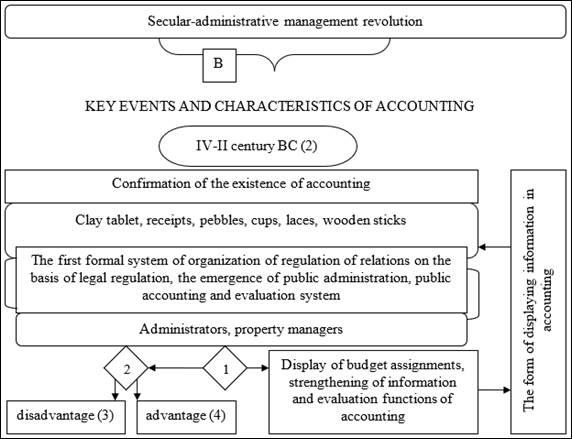
Figure 1:
Characteristic features of accounting for the period of the first and second administrative
revolutions
The third administrative revolution
(secular-administrative) led to the strengthening of the role of the state in
the management of finances and activities of state institutions, and also
served as a basis for regulating the whole complex of social relations,
including the development of social protection, application of motivation. This
became the basis for further development of the information function of
accounting. But at the same time, it became the basis for the emergence of
valuation as an element of the method of accounting. This stage falls on the
second century BC. Its characteristic feature is the formation of the first
formal organization of regulation of relations in the field of accounting, as
well as the transfer of managerial powers from priests to government officials
(holders of state power) (Figure 2).
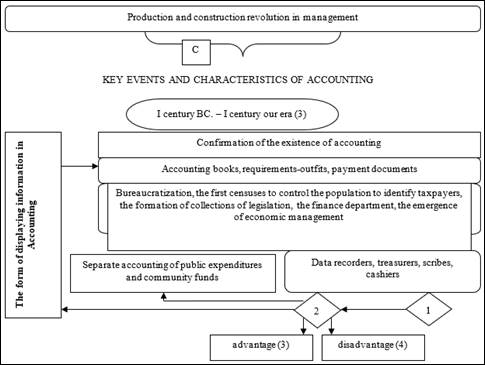
Figure 2:
Characteristics of Accounting in Period of the Third Administrative Revolution
The
centralization of power that took place during this period required a
concentration of information on government spending. During the period under
review, accounting is closely linked to the registration of estimates for the
distribution of public funds.
The
basis for establishing the directions of their use are regulatory documents
(decrees, orders). Although these were mainly decisions made by tsarist
individuals alone, they were public in nature and concerned the organization of
meeting various needs for the community (including the maintenance of troops,
doctors, courts, etc.).
Despite
the peculiarity of primitiveness, which is manifested in the ways and methods
of ensuring revenues to the treasury and their reflection in the books, the
achievement of this period of historical development is that relations are beginning
to develop, which in later times were called public finance.
Accounting in this
period becomes regulatory. Its key feature in relation to public expenditures
is the centralization of management, the presence of persons responsible for
the payment and accounting of taxes. This stage is associated with
strengthening the social role of accounting for the population, the emphasis on
the use of separate accounting of different farms and the implementation of
control procedures, in particular the use of such an element of the method of
accounting as inventory.
Thus, there is a
development of both the management system and accounting as its main source of
information. In particular, the regulation of accounting begins and the
obligation to keep it is established, as well as the main components are
determined - the balance sheet, state accounting books. In general, accounting
is made more suitable for control, management and regulation (Figure 3).
State attention at this
time was paid to the collection of taxes and the distribution of collected
resources for public needs. The emergence of treasurers indicates the
transformation of the management system, the essence of which is to impose
responsibilities for the collection and distribution of public funds to those
responsible at the executive level. In this context, accounting has begun to
play a regulatory role.
Historical period of
I-III centuries distinguished by the advent of Roman law, itinerant scribes
(prototype of hired accountants), as well as the development of the treasury
(in England). This time period is the origin of monetary relations (including
the use of various items to provide them - animal fur, metal axes, etc.). In
the classical sense, the first banknotes in Ukraine appeared during the reign of
Volodymyr Sviatoslavovych the Great (980-1015).
These were the so-called "gold
coins" and "silver coins" (gold and silver coins). Prior to
that, the issues of Greek colonies, coin products of ancient Rome, Arab
dirhams, etc. were used in our country. In the accounting system, the emergence
of money has led to the development of the reflection of exchange equivalents,
i.e. to the use of cost measures. In the IV-XVIII centuries. simple accounting
is conducted, there are requirements for the targeted use of funds, income and
expenditure books, reports, journal-main, balance sheet and other accounting
documentation are used. This period was the fifth administrative revolution,
which was called the geographical (as a result of geographical discoveries of
the XV-XVII centuries). Its impact on the accounting system manifested itself
in the form of the spread of accounting experience from one country to another,
attempts to harmonize the order of reflection of exchange transactions in
accounting.
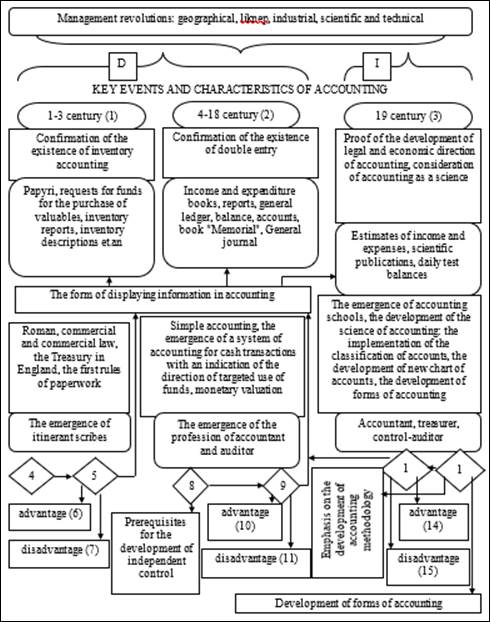
Figure 3: Characteristics of
Accounting in Period of the Fourth Administrative Revolution[3]
The sixth administrative revolution,
called the "liknep revolution", took place in the XVI-XVII centuries.
The key event in it was the appearance of the first printing press. Thanks to
the present invention, significant progress has been made in the implementation
of accounts, as a fixed part of the documents began to print, and the variable
- to enter by hand, which initiated the principles of unification of accounting
documents.
The industrial revolution (XVII-XIX
centuries) had a significant impact on the system of public financial
management. After it, management becomes a separate branch of knowledge, its
methods are developed, experience and ability to manage are disseminated. It
was the cause of the seventh managerial revolution (industrial (XVII-XVIII
centuries)), which led to the development of an accounting system focused on
optimizing the use of resources.
In this context, rapid progress in
the development of accounting methodology can be traced in market economies. It
is worth emphasizing that the emphasis is shifting to the theoretical plane,
numerous scientific publications appear, new economic theories are developed,
which are then actively used in practice due to the impact on efficiency. There
are objective grounds for distinguishing between accounting methodology as a
science and practice.
The combination of theory and
practice allows to raise the accounting system to a qualitatively higher level.
At the same time, discussions on the legitimacy of justifying the development
and expansion of accounting functions are intensifying. A simple way to address
the issues is to take into account the objective processes that take place: the
introduction into practice of accounting methods and techniques that
significantly expand its capabilities, including to improve efficiency not only
at the level of individual business entities but also society in in general;
intensification of the use of accounting information for forecasting purposes.
The eighth managerial revolution
(scientific and technical (late XIX - early XX century)). Led to the formation
of management on a scientific basis, which, in turn, gave impetus to the
intensification of research in the field of accounting. The result is the
development of forms of accounting and improving the procedure for its
maintenance, including in institutions that were maintained at the expense of
the budget. At this time there are accounting schools, the science of
accounting is developing, the emphasis is on improving its theory (Figure 4).
Further
historical development of accounting is associated with the need and expansion
of the use of optimization and analytical methods and techniques. Globalization
processes in the world economy, the orientation of the national accounting system
to the principles formed by international accounting standards, limited
financial and logistical support, as well as continuous informatization
inherent in the modern communications system, allows you to quickly manage the
use of resources. The result of the ninth administrative revolution
(bureaucratic (late nineteenth - early twentieth century)) was the
strengthening of the hierarchical structure of government, which led to the
centralization of accounting, strengthening its regulation and subordination to
the interests of the state.
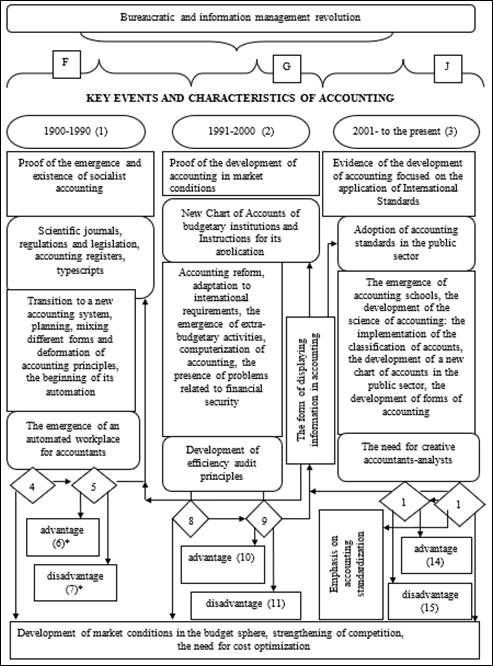
Figure 4:
Characteristics of accounting in the period of the fifth, sixth, seventh and
eighth administrative revolutions[4]
Accounting is aimed at meeting the
requests of higher authorities and monitoring the use of public funds and
property. Rationing is becoming one of the main characteristics of the objects
of accounting. As a result of the development of technical means there is a
gradual automation of accounting, and the desire to unify it and create its
foundations through the approval of uniform forms of accounting documentation
for different entities provides a summary of data by industry and at the
national level.
Planning, characteristic of the
socialist type of economy, had a decisive influence on the accounting. The
relationship between planned and actual indicators made it possible to address
control issues, as planned targets were the norm to accounting.
Accordingly, for the nineteenth
century. characteristic intensification of scientific research in the field of
accounting, as well as the development of accounting scientific schools,
including those focused on the development of the principles of the normative
method of accounting.
At the same time, the purpose of
accounting remained unchanged and was to generate information and report to
higher authorities. At the end of the XX - beginning of the XXI century (Figure
5) accounted for the tenth management revolution (information), which
introduced the use of expert systems, virtual organizations, the widespread use
of electronic communications, the emergence of new organizational forms and
management technologies.
In the XXI century there are
objective prerequisites for intensifying the use of optimization tools. The
actualization of this area of accounting tasks is associated with increased
competition in the budget sphere and further systemic transformation of the
management of entities operating at the expense of budget funds. The latter is no longer associated
with another management revolution, but with the reform of the budget sector,
qualitative changes in the forms, levels and methods of providing services by
budgetary institutions.
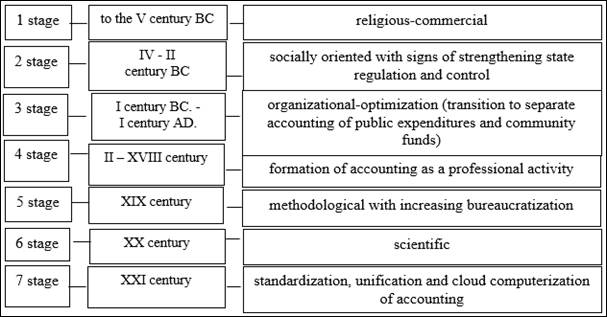
Figure 5: Characteristic features of
accounting in the period ninth and tenth administrative revolutions
Table 2: Advantages and disadvantages of the accounting system of post-Soviet
countries and countries with market economies
|
Indicator
/ feature
|
Accounting
system of socialist countries
|
Advantage
/ disadvantage
|
Accounting
system of market economies
|
Advantage
/ disadvantage
|
|
Management system
|
Centralized. Acute hierarchy
of management structure
|
Comparability of indicators,
single Chart of Accounts / Lack of independence. Non-cybernetics of the
accounting system. The growing influence of wrong decisions from top to
bottom and the distortion of information from bottom to top. Too much
centralization. Development of arbitrariness and excess of official authority
|
Democratic
|
Ability to form reasonable
for a particular entity approaches to the composition and content of
accounting indicators / difficulties for comparison
|
|
Content and purpose of
accounting
|
Subordination to the fullest
provision of satisfaction of constantly growing social needs. Control over
the use of state funds and property (means of public control)
|
Representing the interests of
society and citizens / Difficulties in ensuring the implementation of
individual requests. Lack of the right of initiative
|
Satisfaction of management
requests
|
Ensuring proper management of
public and municipal funds / variety of approaches
|
|
Planning
|
Displays the processes of the
planned activity
|
Allows you to monitor
deviations and ensure the achievement of the planned tasks of budgetary
institutions / No disruptions (risks)
|
Market approaches
|
Ensuring the competitiveness
of entities, focusing on market conditions / (many domestic entities do not
carry out strategic planning at all)
|
|
Representation of interests
|
Public
|
Unity of norms and standards
for all / Problems of solving individual requests.
|
States, municipalities and
citizens
|
National and individual
interests, the ability of municipalities to make their own decisions for
citizens of the local community / lack of equal opportunities for all
citizens
|
|
Level of access to
information
|
The data is available to all
managers
|
Sharing and privacy /
Difficulty of operational correction of plans
|
Basic data are available to
the general public, but there is data for internal use
|
Availability of public
control / closure of confidential information to the general public
|
|
The specifics of the property
of social actors
|
State + a number of entities
of social importance were on the balance of industrial enterprises
(kindergartens, hospitals, health facilities, etc.)
|
Partial transfer of the
burden of social issues to the subjects of the production sphere / The
complexity of the redistribution of resources on the cost items and their
justification
|
State and municipal
|
Extensive rights of local
authorities in resolving issues of the territorial community, including in
relation to local taxes and fees / establishing directions of use of funds by
local authorities
|
|
Approaches to regulation
|
The only approach, rules and
forms of accounting
|
Clarity, clarity and
reliability of credentials / Corruption, fear of management and lack of
initiative
|
The presence of the influence
of public Àccounting organizations
|
Freedom in choosing the form
of accounting / problematic formation of statistical indicators
|
Source: Formed by the authors on the basis of generalization of current
accounting practice
The external manifestation of the
systemic transformation of management has affected the sources of financial
support for the provision of services, the organization of accounting for
transactions related to the expenditure of budget funds, the level of autonomy
of the subjects of the budget sphere, and so.
3.2.
Is there a connection between the
transformation of the management system and the development of the Accounting
system?
Studies show that the stages of
development of accounting are associated with the transformation of the
management system of business entities, which changes its objectives and
principles. On this basis, 7 stages of the historical development of accounting
in budgetary institutions are identified (Figure 6).

Figure 6: Stages of development of
accounting in the field of public sectors on the basis of the impact of
management system requests
Unification of
accounting nowadays is carried out on the basis of introduction of requirements
of the international standards. The approval on their basis of the National
provisions (standards) of accounting in the public sector is aimed not only at
unifying approaches to accounting, but also involves a change in the philosophy
of budget management. A special role in this context is played by the approved Chart
of Accounts in the public sector, developed on the basis of harmonization with
the budget classification of expenditures.
The emphasis on building
a clear vertical for the reflection of budget funds in the accounts indicates
the desire to strengthen control over their formation and use. From the
standpoint of demonopolization of public sector management, such an approach by
the state is quite logical. Thus, the periodization of the development of
accounting on the basis of the impact of management system requests indicates a
close relationship between changes in accounting characteristics depending on
the transformational changes in management structures. From this follows the
conclusion about the expediency of taking into account the systemic transformation
of the management of budgetary institutions in the development of the
principles of modernization of accounting.
Thus, it should be
emphasized that the results of the genesis of accounting is a necessary
condition for the development of an improved concept, which includes solving
problems of theory, organization and methodology. Our research results indicate
the connection between the transformation of management and the development of
the accounting system.
The characteristics of
accounting, established as a result of the analysis of historical, as well as
economic foreign and domestic sources, indicate the presence of a close
relationship between it and the systemic changes that have taken place in
management.
REFERENCES
Diadiun, O., Petryk, O., Semenyshena, N.,
Khorunzhak, N., & Kalinichenko, S. (2020). Integrated Reporting in the Conditions of Sustainable Development:
Institutionalization through Standardization. Intellectual
Economics, 14(2), 67-86. DOI: https://doi.org/10.13165/IE-20-14-2-02.
Fleischman, R. K., Funnel, W., & Walker, S. (2012). Critical Histories of
Accounting. London: Rout ledge.
Jäger, E. L. (2010). Supplement zu den zwei
Hauptwerken über die Geschichte der Buchhaltung, Nämlich zu 1. Lucas Paccioli und
Simon Stevin, 2. Beiträge zur Geschichte der Doppelbuchhaltung (German
Edition). Publisher: Nabe Press.
Kaplan, R. (1984). The Evolution of
Management Accounting. The Accounting Review, 59(3), 390-418.
Khomyn, P. Ya., & Zhuravel H. P. (2007). Paradyhma y kontroverzy
bukhhalterskoho obliku ta zvitnosti (sproba konsekventnoho analizu):
monohr. Ternopil: Ekonomichna dumka. [in Ukrainian].
Leyerer, C. (1919). Theorie der Geschichte der Buchhaltung. Brunn: M. Trill. Avaible: http://www.buchen.ch/Geschichte_der_doppelten_Buchhaltung.pdf.
Access: 12 August 2020.
Logosha, R., Moroz, I., Semenyshena, N., & Chykurkova, A. (2019). Market Institute:
research methodology in context of basic cognitive approaches. Intellectual
Economics, 13(2), 172-194. DOI: https://doi.org/10.13165//IE-19-13-2-09.
Marks, K. (1885). Kapytal. T. 2. SPb. [in Russian].
Novychkov, N. V.
(2007). Teoryia orhanyzatsyy. Moskow: HUU. [in
Russian].
Omelchenko, M., & Zatoka, L. (1998). Vidobrazhennia kozatskoi doby v Ukraini na
dilovykh paperakh. Novi
doslidzhennia pamiatok kozatskoi doby v Ukraini, 7, 35-39. [in
Ukrainian].
Radchenko, O., Semenyshena, N.,
Sadovska, I , Nahirska, K.,
& Pokotylska, N.
(2020). Foresight Development Strategy of the Financial Capacity: Comparative
Study of the Ukrainian Agricultural Sector. Engineering Economics,
31(2), 178–187. DOI: https://doi.org/10.5755/j01.ee.31.2.24340
Rasid, S. Z. A., Saruchi, S. A., & Tamin R. S. M. (2019). The eminence of the
4th industrial revolution: how it transformed management accountants. Advances in Social Science. Education and
Humanities Research, 308, 186-189. Available: https://www.atlantis-press.com/proceedings/insyma-19/55915458. Access:
15 August 2020.
Razumkov Tsentr (2020). Hromadska dumka naselennia shchodo reformy
detsentralizatsii ta yii rezultativ. Available: https://razumkov.org.ua/napriamky/sotsiologichni-doslidzhennia/gromadska-dumka-naselennia-shchodo-reformy-detsentralizatsii-ta-ii-rezultativ-serpen-2020r. Access:
17 August 2020.
Semenyshena, N., Khorunzhak, N., & Sadovska, I. (2020). Evaluation of the Adaptability of
the Scientific Theories for the Development of Accounting Institute. Intellectual Economics, 14(1), 114-129.
DOI: 10.13165/IE-20-14-1-07.
Semenyshena, N., Khorunzhak, N., & Zadorozhnyi, Z.-M. (2020). The Institutionalization of Accounting: the Impact of National Standards
on the Development of Economies. Independent
Journal of Management & Production, 11(8), 695-711.
DOI: 10.14807/ijmp.v11i8.1228.
Semenyshena,
N., Sysiuk, S., Shevchuk, K., Petruk, I., & Benko, I. (2020). Institutionalism in Accounting: a Requirement of the Times or a Mechanism
of Social Pressure? Independent Journal of Management & Production, 11(9), 2516-2541. DOI: 10.14807/ijmp.v11i9.1440
Slabchenko, M. E. (1925). Orhanyzatsyia
khoziaistva Ukrayny ot Khmelnychchyny do myrovoi voiny. Ch. 1: Khoziaistvo
Hetmanshchyny
v XVII–VIII stoletyiakh. T. 4: Sostav i upravlenye hosudarstvennym khoziaistvom
Hetmanshchyny
XVII–XVIII vv. Odesa: Hos. yzd-vo Ukrainy. [in Ukrainian].
Sokolov, Ya. V. (1995). Bukhhalterskyi uchet:
ot ystokov do nashykh dnei. Moskow: Audyt. [in Russian].
Svirko, S. V. (2006). Bukhhalterskyi oblik u
biudzhetnykh ustanovakh: metodolohiia ta orhanizatsiia: monohr. Kyiv: KNEU.
[in Ukrainian].
 ACCOUNTING
INSTITUTE: ON THE GENESIS AND IMPACT OF MANAGEMENT REVOLUTIONS
ACCOUNTING
INSTITUTE: ON THE GENESIS AND IMPACT OF MANAGEMENT REVOLUTIONS